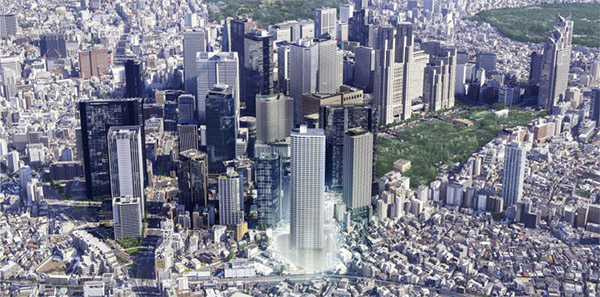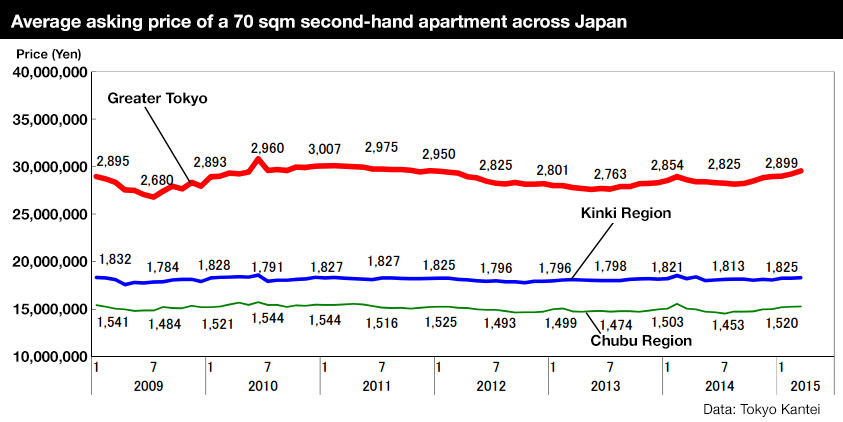Toranomon fast becoming a hotspot of development
The 2020 Summer Olympics and 2027 opening of the new maglev line have helped to spur along some major construction projects in Tokyo, in particular the Toranomon area.
Since the opening of Toranomon Hills in 2014, the Toranomon area is quickly emerging as Tokyo’s newest hub for international business. It is not just an office area, as nearby hotels, hospitals, and serviced apartments are also in the process of being built. There are also plans for a new station along the Hibiya Line that will connect with Toranomon Hills.
Mori Building is the major player in this district, and plans to invest over a trillion Yen in projects in the Toranomon and Roppongi area over the next 10 years.Read more
Kyoto’s machiya revival
The traditional wooden merchant houses (machiya) lining the streets in Kyoto are a defining part of the historic city’s atmosphere. Yet, over 5,000 of these machiya are vacant, and approximately 2% of them are demolished each year.
Some of these homes are being converted into guesthouses and have been very popular with foreign visitors.Read more
High-rise apartment trends from 2015 onwards

According to data compiled by the Real Estate Economic Institute, there are currently 262 super high-rise* residential buildings containing 101,450 apartments planned for completion across Japan from 2015 onwards. This is an increase of 75 buildings and 25,910 apartments from last year.
77,824 of the apartments, comprising 76.7% of the total, are located in the greater Tokyo area, and 50,371 apartments (49.7%) are within Tokyo’s 23 wards.
The planning and construction of super high-rise apartment buildings began to increase in the late 1990s. High-rise apartment buildings have remained steadily popular with buyers, and have retained relatively strong re-sale values.
However, the downturn in the property market following the collapse of Lehman Brothers in late 2008 saw developers limit the supply of new construction. As a result, the annual supply of apartments went from 35,609 in 2009 to 17,967 in 2010. The Tohoku tsunami and earthquake in 2011 saw a number of projects in the Tohoku and Kanto regions delayed, and new supply dropped to 13,321 apartments.Read more
Historic Yokohama building to be converted into shared office

The historic former Kanto Local Finance Bureau building in downtown Yokohama will re-open in 2016 as a restaurant and shared office space after undergoing restoration and renovations.
The heritage listed property was built in 1928 and was originally the Yokohama ranch office of Nihon Menka - a raw cotton importer that is now Sojitz Corporation. It was temporarily confiscated by the US during the occupation in 1952, before being sold to the national government in 1954. From 1960 it was used as the Yokohama branch of the Ministry of Finance. Yokohama City acquired the 4-storey concrete building in 2003.
In August 2014, Yokohama City started an appeal to find suitable uses for the building. The Yokohama DeNA BayStars baseball team were selected out of nine applicants to manage and operate the building.Read more
Possible plans for a 66-storey apartment building in Shinjuku

According to a recent article in the Shinjuku Shimbun, there are plans for two 60+ storey apartment buildings in Nishi-Shinjuku. A recent press release by the Real Estate Economic Institute suggests that the project will include two residential towers - a 66-storey and 50-storey tower containing a total of 2,500 apartments.
The Nishi-Shinjuku 3 Chome West District Redevelopment is located directly to the west of Shinjuku Park Tower (52 storeys; 235m). Construction is tentatively scheduled to start in 2019.
Redevelopment discussions began back in 1993, but plans have been changed and delayed over the years. The original plans drawn up for this site in 2000 included four towers - a 77-storey office tower (339m), 2 x 66-storey residential towers (245m) and a 50-storey residential tower (190m). There was even talk of adding a new train station between Shinjuku and Hatsudai Stations on the Keio Line, or extending an underground pedestrian passageway to provide direct access from Shinjuku Station. However, obtaining consensus among landowners and acquiring the necessary parcels proved a difficult task. The project was delayed and eventually abandoned after the economic downturn in 2008.Read more
Apartment asking prices up for 7th month in a row

Second-hand apartment prices in greater Tokyo continue to rise this month with the average asking price of a 70 sqm (753 sq ft) apartment up 1.1% from February and up 3.3% from last year. This is the 7th month in a row to see a month-on-month increase. According to Tokyo Kantei, the average apartment asking price greater Tokyo in March was 29,560,000 Yen.
In Tokyo’s 23 wards, the average asking price was 45,360,000 Yen, up 1.7% from the previous month and up 9.4% from last year. The average building age was 22.1 years. The property market in Tokyo is far-outperforming Yokohama City (+1.5% from March 2014), Saitama City (+2.5%), Chiba City (-2.3%) and Osaka City (+3.1%).
Prices continue to reach new highs in central Tokyo’s six wards with the average asking price reaching 64,680,000 Yen, an increase of 2.1% from February and and increase of 13.0% from last year. This is the 9th month in a row to see a month-on-month increase. The gap between price rises in central Tokyo and other wards is becoming more apparent.
Asking prices are being supported by an increase in actual contracted prices. Sellers and real estate brokers are also setting higher and higher asking prices. The market for second-hand properties in Tokyo has been strengthening as a shrinking supply of new apartments is causing buyers to consider older apartments which are typically less expensive. Demand from investors is also strong, and properties that have been set at high prices are starting to sell without any discounting.Read more
Luxury ryokans seeing surge in investment

With expectations of growing demand from travellers and foreign tourists, luxury ryokans (traditional Japanese inns) and hotels across Japan are now a highly sought-after target by funds and major real estate companies. This means foreign investors looking to get into the hotel market in Japan will be facing increasingly tough competition from domestic investors.
This month, real estate giant HULIC will acquire two hotel properties in Hakone and Atami from Kato Pleasure Group. HULIC’s main business is office leasing and management, but with a declining population, they have been expanding their operations to other areas of the property market.Read more

